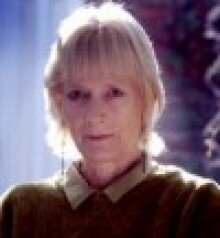
Pauline Stainer has always worked outside the metropolitan poetry community. Yet she won first prize in the Stroud Festival poetry competition in 1984, and has won major awards in several other competitions, including the TLS and the King’'s Lynn, Cheltenham, Leek, Hastings and York festival competitions. She was awarded a Hawthornden Fellowship in 1987, and came to wider notice with her quietly beautiful first volume, The Honeycomb (1989). Like her next books, Sighting the Slave Ship (1992) and The Ice-Pilot Speaks (1994), it was a Poetry Book Society Recommendation. In 1994 she was selected for the seminal New Generation Poets promotion. Her fourth collection, The Wound-Dresser's Dream (1996), was short-listed for the Whitbread Poetry Award.
Stainer, who is from the English Midlands, read English at St Anne’s College, Oxford. She moved to Essex – and became profoundly influenced by traces of Anglo-Saxon and Viking culture in that landscape. Something like a Norse quest has indeed played out in her own writing which, during the 1990s, became gradually fascinated by ideas of the north, northern spirituality and epistemology in particular, to the point where she moved to the Orkney island of Rousay for several years.
These preoccupations were unfashionable in a Britain which was then learning to take for granted its package holidays in the sun – and indeed a general brashness driven by shifts in education and society. Aspects of northernness seemed to correspond, in Stainer’s poetic universe, to a delicacy of apprehension, an inwardness, which resisted the facile in both thought and culture. A writer who emerged at a time when British women poets were expected to write lite, whether comic or sexy – often seeming under pressure to leave Big Ideas to their male peers – Stainer has remained a resolute independent. Though beautiful, her poetry is steely in both its control of diction and the intellectual exactitude with which she will map, for example, a Japanese garden onto a piece by a contemporary garden; or mediaeval Christian iconography onto the contemporary psyche.
Though easy to read, Stainer’s beautifully coloured miniatures are exacting in what they ask of us – questions about our own place in the world as much as about our degree of cultural, religious and human literacy. When a Stainer poem makes us wonder how much we understand about the (often spiritual) culture it reworks, it is also asking what it means to lead an unexamined life, one lacking in spiritual literacy.
After Parable Island (1999) – outcome of the years on Rousay – and A Litany of High Waters (2002), Bloodaxe published The Lady and the Hare: New and Selected Poems (2003). Stainer returned to East Anglia and now lives in Suffolk. Meanwhile, her work is shifting its focus towards the Far East.
These poems come from her next collection Crossing the Snowline, out from Bloodaxe in October 2008.
Bibliography:
The Honeycomb, Bloodaxe Books, Northumberland, 1989
Sighting the Slave Ship, Bloodaxe Books, Northumberland, 1992
The Ice-Pilot Speaks, Bloodaxe Books, Northumberland, 1994
The Wound-dresser's Dream, Bloodaxe Books, Northumberland, 1996
Parable Island, Bloodaxe Books, Northumberland, 1999
A Litany of High Waters, Kings Lynn Poetry Festival, Kings Lynn, 2002
The Lady and the Hare: New and Selected Poems, Bloodaxe Books, Northumberland, 2003
Links:
Stainer on Bloodaxe
Visit Pauline Stainer’s page on the Bloodaxe website

